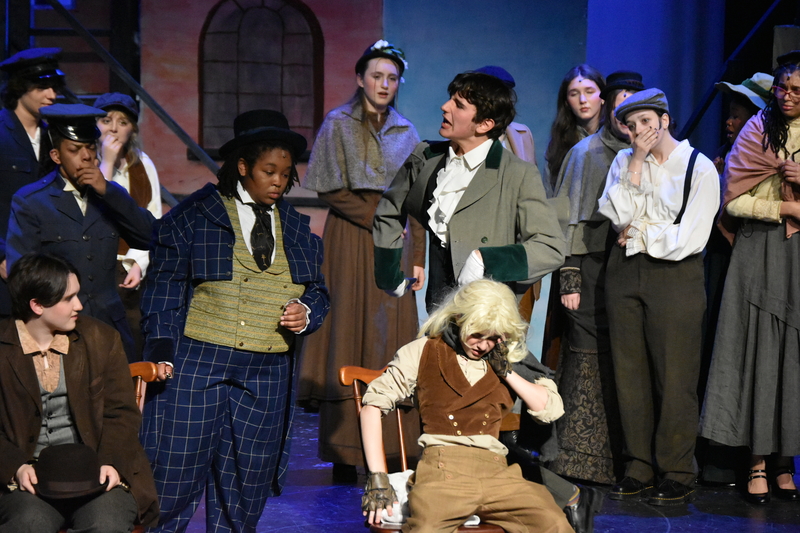
As the lights rise on the stage, thunder boomed through the speakers signifying the beginning of the last week on Earth. That is how the play, written by Grady Teacher Jermaine Quincy Ross, Slum Beautiful, starts.
On Saturday, Jan. 12, Ross held a reading of his play at Grady’s Black Box Theatre. He invited people to come and listen and give feedback. The reading consisted of nine actors sitting at stands with scripts. Ross describes the process of a play like a comedian preparing for a segment.
“Before Chris Rock goes out in front of 70,000 people, he would spend lots of hours going to some country club in Atlanta with 100 people there and just try those jokes out,” Ross said. “Then he would develop and mature the routine he’s going to do. He knows what people will like and what they will laugh at. No one hears all those bad jokes that came out originally.”
Ross asked Gabangaye Gcabashe, a chemistry teacher at Grady to read the part of Mr. Muhammad, the pizza joint owner. This reading was Gcabashe’s first acting role since high school.
“You always come to things and it is polished, but a lot of work goes into it,” Gcabashe said.
All that hard work included multiple readings between Ross and the actors in the morning and another one in the afternoon before the public reading took place. The actors would read through the script and Ross would make things clear and make edits when necessary.
Senior Charlie Denton was among the 20-25 people that attended the reading on the Jan. 12.
“Mr. Ross did a good job in that there needs to be flaws in the characters but also redeeming qualities,” Denton said.
A couple of things that Ross is planning on changing include using the n-word less, adding length to Act 2 and letting the audie nce deepen the understanding of the cha racters. The next reading will be held on Feb. 23 at Grady in the Black Box Theatre.
“I wanted people to come in, laugh a while and walk out smiling,” Ross said. “And that’s what happened”.
Ross, who started teaching math at Grady this year, grew up in a town south of Memphis and played football throughout high school and for the first two years of college. Ross acted in the spring musical every year in high school and, in addition, wrote and directed plays, which he continued to do during and after college.
“I won first place in the 1999 and 2000 Mississippi Community College Creative Writing Association’s contest for playwriting and short story,” Ross said. “I directed plays when I was a senior in college. I started an acting group with a group of students my junior year. After I graduated college, I worked at a community theatre, and I did plays like Dream Girls.”
Ross completed the Master of Fine Arts programs at Kennesaw and independently studied the curriculum that makes up the Yale Master of Fine Arts degree. This meant that Ross received the Yale curriculum, bought the necessary books, and read through everything himself without a teacher. Ross also directed a play at Carver High School last year, where he taught math.
After all that studying and directing, in 2012, Ross sat down and wrote Slum Beautiful over the course of eight months.
“I could have finished it faster, but there were moments when I would stop and still try to get to know the characters,” Ross said. “I would stop writing for a month and just think about who the characters are and what they would do or say in such a situation. It took about eight months to really know who the characters were and set an idea of who I wanted the characters to be.”
Slum Beautiful follows the lives of five friends who work at a dead-end pizza joint in East Point. When President Obama announces that the world is to end in seven days, the friends decide to shoot for their dreams. Over the week that the story takes place, strange occurrences start happening like huge storms, and at one point, it starts to rain frogs.
“It’s a comedy, but it’s also a really intense drama, too,” Ross said.
Before writing Slum Beautiful, Ross spent a while living in East Point.
“I liked the community, and so I wanted to write a story about it,” Ross said. “It had it’s own swag so to speak. It had its own way of doing things. The people there really like it, and it’s a great community to be in.”
In order to get a feel for the community, Ross would ride the buses and trains, and he based a couple of the characters in the play on stories that he heard. Ross’ favorite playwright, August Wilson, inspired Ross to give a voice to the people of East Point.
“He writes a lot about African-American experiences,” Ross said. “He tries to give a voice to the people that people don’t like writing stories about. He gives a voice to the janitor or the guy that drives the bus or the cab driver. He writes stories about those simple, everyday people of our world.”














harriet fry • Feb 15, 2013 at 10:37 am
Thanks for an enlightening article. I can’t wait until the play becomes a movie!